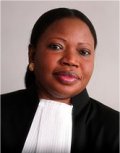Justice In Profile
Fatou Bensouda
Republic of Gambia
Prosecutor, International Criminal Court
 By: Lucia Druetta, Assistant Editor, International
Judicial Monitor and Director of Academic Programs, International Judicial
Academy
By: Lucia Druetta, Assistant Editor, International
Judicial Monitor and Director of Academic Programs, International Judicial
Academy
When the International Criminal Court was created ten years ago, one of the very early tasks of the Assembly of States Parties of the ICC (ASP) was to select a chief prosecutor. The ensuing search resulted in the selection of a veteran Argentine prosecutor, Luis Moreno Ocampo, as the first ICC prosecutor. He was formally elected on April 21 2003 for a term of nine years. The Deputy Prosecutor, selected in 2004, was Fatou Bensouda of Gambia. The ASP, on December 12, 2011 elected Ms. Bensouda as the new ICC Prosecutor. Mr. Ocampo’s term ended on June 15 of this year. She took office on June 16.
The Office of the Prosecutor (OTP) is one of four organs of the ICC together with the Presidency, the Judicial Divisions and the Registry; and was established by the Rome Statue in 1998. Its main duty is to examine, investigate and prosecute specific crimes such as genocide, crimes against humanity and war crimes that are within the jurisdiction of the Court. Pursuant to Articles 42 (3) and (4) of the Rome Statue, the Prosecutor must be person of high moral character, be highly competent in and have extensive practical experience in the prosecution or trial of criminal cases and shall be elected by secret ballot by an absolute majority of the members of the Assembly of States Parties.
Prior to joining the Office of the Prosecutor at the ICC, Ms. Bensouda served as State Counsel of the Republic of Gambia, then Attorney General and Minister of Justice. In the latter capacity she served as Chief Legal Advisor to the President and Cabinet of the Republic of the Gambia between 1987 and 2000. After a short two-year period of private practice, she worked as a Legal Adviser and Trial Attorney at the International Criminal Tribunal for Rwanda (ICTR) from 2001 to 2004.
Ms. Bensouda received her law degree from Obafemi Awolowo University in Nigeria and a Master of Laws (LL.M) degree from the International Maritime Law Institute of the International Maritime Organization located in Malta. She is fluent in English and has a working knowledge in French. She has written one book and co-authored two additional ones. She has been presented with the 2009 International Court of Justice International Jurists Award for contributions to national and international criminal law and the 2011 World Peace through Law Award presented by the Whitney Harris World Law Institute of Washington University in St. Louis, Missouri.
Since its creation the OTP has been involved in several investigations involving African countries. The newly appointed Prosecutor will take over seven on-going investigations that have been referred by individual country authorities (cases of Uganda, The Democratic Repubic of the Congo and The Central African Republic), by the UN Security Council (cases of Darfur and Libya) and by the OTP itself (cases of Kenya and the Côte d’Ivoire) according to article 13 of the Rome Statue. In addition Mrs. Fansouda will be heading the preliminary examinations of situations in Afghanistan, Georgia, Guinea, Colombia, Honduras, Korea and Nigeria.
Ms. Bensouda will also face a difficult challenge coming from an African country. Despite having received important support from the African States Parties to the Rome Statue to be elected, concerns remain among these countries about the ICC. Some African countries consider themselves to be ‘targeted’ by the ICC. In fact, since the arrest warrant against Sudan’s President Omar Al Bashir, who visited the ICC signatories Chad and Kenya without being detained, and the consequent decisions of ICC Pre-Trial Chamber One regarding failure of cooperation requests, the African Union has demonstrated more unrest towards the ICC. This attitude has been expressed not only by ignoring the ICC decisions regarding cooperation but also voicing its intention to expand the jurisdiction of the African Court of Human and People’s Rights. To this end, African Union legal experts have met during this month in Addis Adaba to address recommendations on expanding the jurisdiction of that court to handle international criminal cases and to have some ongoing ICC investigations transferred to the African court.
In her new position, Ms. Bensouda will be in a position to dispel these concerns and show that the ICC has no double standards of justice, as some believe. In that respect, she has stated that 'I’m an African, I'm proud of that. But I am a prosecutor for 121 states, not just African states - and I will continue as I have been doing in applying the law".

 International
Judicial Monitor
International
Judicial Monitor